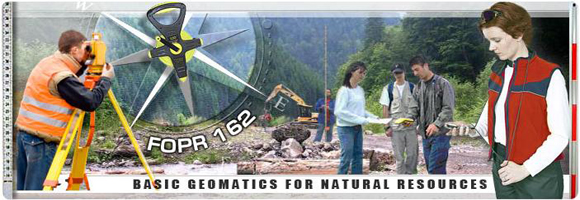
Course Outline
Many professionals and researchers must understand, and be capable to do, measurements and surveys in field conditions. This project is intended to provide the basic skills from which more advanced skills can develop.
Topics include:
- Slope, vertical, and horizontal measurements by direct and indirect methods
- Measurement of vertical and horizontal angles
- Compass theory including the earth’s changing magnetic forces
- Specific resource measurements
- Orienteering and traversing
- Differential leveling and stadia measurements
- Electronic measurements and surveys
- Calculating and dealing with error
- Mapping and related calculations.
Course Description:
Lesson 1: Title: How Far? How High? How Steep? (The Basics of Measurements)
Description: This lesson will introduce types of measurements & surveys, the equipment used, accuracy & precision, error, and recording data.
Lesson 2: Title: Which Way? (Direction)
Description: This lesson will introduce the determination of direction and “running” and plotting of a closed survey.
Lesson 3: Title: Up or Down? (Precision Differential Leveling)
Description: Many projects require precise measurements of elevations and vertical differences. This lesson demonstrates differential leveling to a precision of one millimeter.
Lesson 4: Title: It’s Impossible! (Indirect Measurements)
Description: This lesson introduces methods of using triangulation and stadia to measure distances.
Lesson 5: Title: There Must Be an Easier Way! (Electronic Surveying)
Description: This lesson explains and demonstrates laser and GPS (Global Positioning System) equipment.
Lesson 6: Title: How Big? (Determining Area)
Description: This lesson will examine several methods of determining areas of a polygon. The methods will range from approximations to accurate calculations based on traverse co-ordinates.
Laboratories
Students will be required to complete six intensive field studies. The following are the options for distance education students:
- If a student has related work experience or a previous course (e.g. orienteering) that covers the applications of a lab, an exemption may be requested. In most cases, supporting evidence will be required. Labs can also be modified to reflect unique circumstances of either the student or site conditions.
- The student may complete any or all labs on his/her own. The student is responsible for obtaining the necessary equipment (including expenses), finding a suitable site for the field exercise, and recruiting an assistant where needed. The course instructor will advise students of any other student taking the course in the same geographic region for the purpose of teaming up for lab exercises.
- The student may ask to join an organized lab “camp”. Subject to demand, these camps will be 3 days in duration and held in late April in the Vancouver area, and/or Williams Lake in late August. These camps will require incremental fees to cover room, board, and other costs.
